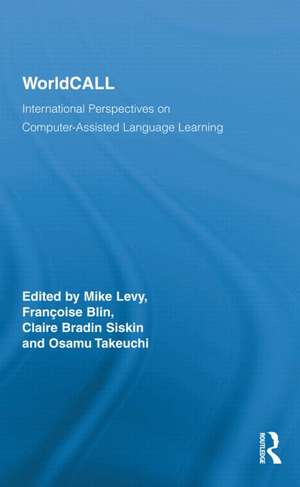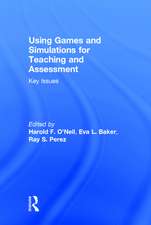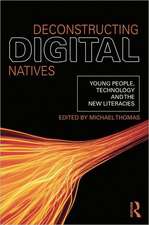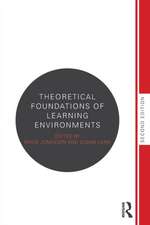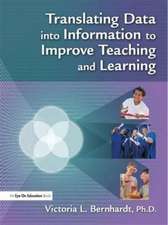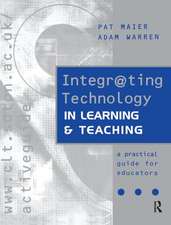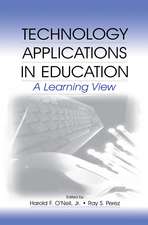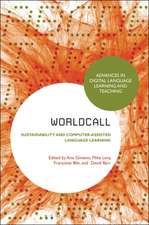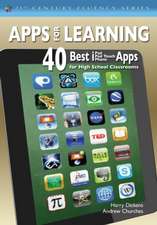WorldCALL: International Perspectives on Computer-Assisted Language Learning: Routledge Studies in Computer Assisted Language Learning
Editat de Mike Levy, Françoise Blin, Claire Bradin Siskin, Osamu Takeuchien Limba Engleză Hardback – 21 dec 2010
| Toate formatele și edițiile | Preț | Express |
|---|---|---|
| Paperback (1) | 484.31 lei 6-8 săpt. | |
| Taylor & Francis – 3 iul 2014 | 484.31 lei 6-8 săpt. | |
| Hardback (1) | 1230.51 lei 6-8 săpt. | |
| Taylor & Francis – 21 dec 2010 | 1230.51 lei 6-8 săpt. |
Preț: 1230.51 lei
Preț vechi: 1500.62 lei
-18% Nou
Puncte Express: 1846
Preț estimativ în valută:
235.45€ • 246.50$ • 194.83£
235.45€ • 246.50$ • 194.83£
Carte tipărită la comandă
Livrare economică 07-21 aprilie
Preluare comenzi: 021 569.72.76
Specificații
ISBN-13: 9780415880862
ISBN-10: 0415880866
Pagini: 376
Ilustrații: 42 b/w images, 30 tables, 36 halftones and 6 line drawings
Dimensiuni: 152 x 229 x 25 mm
Greutate: 0.81 kg
Ediția:1
Editura: Taylor & Francis
Colecția Routledge
Seria Routledge Studies in Computer Assisted Language Learning
Locul publicării:Oxford, United Kingdom
ISBN-10: 0415880866
Pagini: 376
Ilustrații: 42 b/w images, 30 tables, 36 halftones and 6 line drawings
Dimensiuni: 152 x 229 x 25 mm
Greutate: 0.81 kg
Ediția:1
Editura: Taylor & Francis
Colecția Routledge
Seria Routledge Studies in Computer Assisted Language Learning
Locul publicării:Oxford, United Kingdom
Public țintă
Postgraduate and UndergraduateCuprins
List of Figures. List of Tables. Preface. Introduction. Section 1: New Technologies, New Pedagogies 1. Blogging, Collaborative Writing and Multimodal Literacy in an EFL Context Hsien-Chin Liou 2. Podcasting in Foreign Language Learning: Insights for Podcast Design from a Developmental Research Project Wai Meng Chan, Ing Ru Chen and Martin G. Döpel 3. Mobile Technologies and Language Learning in Japan: Learn Anywhere, Anytime Midori Kimura, Hiroyuki Obari and Yoshiko Goda 4. EFL Students’ Metalinguistic Awareness in E-Mail Tandem Akihiko Sasaki and Osamu Takeuchi 5. Facilitating Collaborative Language Learning in a Multicultural Distance Class over Broadband Networks: Learner Awareness to Cross-Cultural Understanding Yuri Nishihori Section 2: Developing Language Skills through Technology 6. Improving Pronunciation by Accent Reduction and Text-to-Speech Software Ferit Kılıçkaya 7. Using Computer Keystroke Recording Software to Analyse Patterns of Revision in English Language Schools Erifili Roubou 8. Modeling Language Learners’ Knowledge: What Information Can Be Inferred =From Learners’ Free Written Texts? Sylvie Thouësny and Françoise Blin 9. Automatic Online Writing Support for L2 Learners of German Through Output Monitoring by a Natural-Language Paraphrase Generator Karin Harbusch and Gerard Kempen 10. EFL Acquisition of English Causative Alternation with Integrated Concordances Yuxia Wang and Suen Caesar Lun Section 3: Materials Design & Development 11. Blended Learning, Empowerment, and World Languages in Higher Education: The Flexi-Pack Project for ‘Languages of the Wider World’ Nathalie Ticheler and Itesh Sachdev 12. Intermediate Online English: An Example of Self-Access Courseware Development Ana Gimeno-Sanz 13. Integration of Technology for Effective Learning, Teaching and Assessment Debbie Corder and Alice U 14. The E-Job 100 Project: CALL for Increasing Motivation for Learning English Akiyoshi Suzuki and Teresa Kuwamura Section 4: Learner Training 15. Pervasive CALL Learner Training for Improving Listening Proficiency Kenneth Romeo and Philip Hubbard 16. Guiding the E-Learner in Foreign Language and Communication Courses Maija Tammelin, Berit Peltonen and Pasi Puranen Section 5: Teacher Education 17. The Use of ICTs in Foreign Language Teaching: The Challenges of a Teachers’ Education Program Carla Barsotti and Claudia Martins 18. ‘We Argentines Are Not as Other People’: Collaborative Learning Online in an Underserved Country Marie-Noëlle Lamy 19. Electronic Portfolios in a BA CALL Course: Supporting Reflective And Autonomous Learning Salomi Papadima-Sophocleous 20. Voices from EFL Teachers: A Quantitative Investigation of Teachers’ Use of CALL Seijiro Sumi
Descriere
This edited volume focuses on international perspectives in Computer-Assisted Language Learning (CALL) in all of its forms, including Technology Enhanced Language Learning, Network-Based Language Learning, Information and Communication Technologies for Language Learning.
